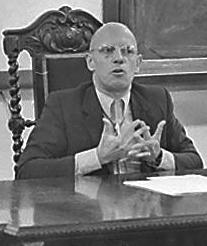Michel Foucault najznámejšie citáty
Michel Foucault: Citáty v angličtine
“What desire can be contrary to nature since it was given to man by nature itself?”
Zdroj: Madness and Civilization: A History of Insanity in the Age of Reason
Zdroj: The Birth of the Clinic: An Archaeology of Medical Perception
As quoted in Michel Foucault (1991) by Didier Eribon, as translated by Betsy Wind, Harvard University Press, p. 282
Kontext: There are more ideas on earth than intellectuals imagine. And these ideas are more active, stronger, more resistant, more passionate than "politicians" think. We have to be there at the birth of ideas, the bursting outward of their force: not in books expressing them, but in events manifesting this force, in struggles carried on around ideas, for or against them. Ideas do not rule the world. But it is because the world has ideas (and because it constantly produces them) that it is not passively ruled by those who are its leaders or those who would like to teach it, once and for all, what it must think.
“there is no glory in punishing”
Zdroj: Discipline and Punish: The Birth of the Prison
Zdroj: The History of Sexuality, Volume 1: An Introduction
“The language of psychiatry is a monologue of reason about madness”
Preface to 1961 edition
History of Madness (1961)
Kontext: The constitution of madness as mental illness, at the end of the eighteenth century, bears witness to a rupture in a dialogue, gives the separation as already enacted, and expels from the memory all those imperfect words, of no fixed syntax, spoken falteringly, in which the exchange between madness and reason was carried out. The language of psychiatry, which is a monologue by reason about madness, could only have come into existence in such a silence.
Zdroj: The History of Sexuality, Volume 2: The Use of Pleasure
Preface to 1961 edition
History of Madness (1961)
Las Meninas
The Order of Things: An Archaeology of the Human Sciences (1970)
Part Two: 2. The Transcendence of Delirium
History of Madness (1961)
Vol I: La volonté de savoir
An Introduction. NY: Pantheon. Translated from French by Robert Hurley. Page 43
History of Sexuality (1976–1984)
Part Four, Complete and austere institutions
Discipline and Punish (1977)
In reference to Sadism and Masochism, as quoted in Who's Who in Contemporary Gay & Lesbian History: From World War II to the Present Day (2001) by Robert Aldrich and Gary Wotherspoon
Vol. I, p. 101
History of Sexuality (1976–1984)
"What is an author?" (1984)
Part Two: 2. The Transcendence of Delirium
History of Madness (1961)
Lecture 2, January 17, 1979, pp. 45-46
The Birth of Biopolitics (1978)
Zdroj: Lectures on the Will to Know (1970), pp. 4-5
Lecture 2, January 17, 1979, p. 36
The Birth of Biopolitics (1978)
Part One: 5. The Insane
History of Madness (1961)
Part Three, The Means of Correct Training
Discipline and Punish (1977)
Zdroj: Discipline and Punish (1977), pp. 13, Chapter One The Body of the Condemned
